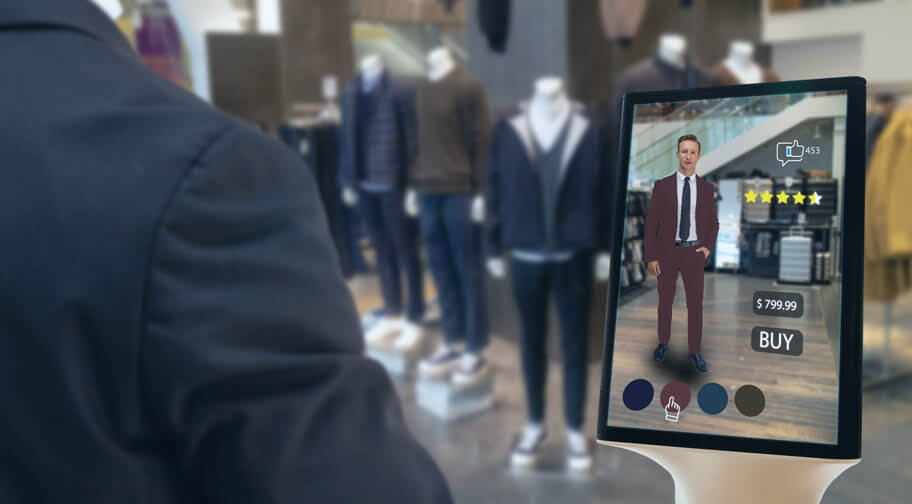Welcome to a new virtual world! Following Nike and Adidas, many premium fashion brands are using Augmented Reality (AR) and Virtual Reality (VR) to start fashion retail businesses in the Metaverse. Read on to understand the blossoming Metaverse fashion industry.
Mark Zuckerberg, co-founder of Meta Platforms Inc., formerly Facebook, has become a fervent metaverse evangelist and has refocused his company on the idea. In a recent video published by Meta, Zuckerberg is seen getting ready for a typical day, which starts with putting on his iconic Mark Zuckerberg grey t-shirt that overlays digital elements in the real world. Next, he walks over to an area where a cartoonish avatar stands and uses gestures to change its outfit, cycling through different styles, including a plain long-sleeve crewneck and jeans, a T-shirt and jeans, and a spacesuit.
“You’re going to have a wardrobe of virtual clothes for different occasions, designed by different creators and from different apps and experiences,” Zuckerberg then explains in the video how Metaverse avatars will have different fashion styles available to them.
Hypothetically, one might have a photorealistic one for work and a more stylized one for hanging out online. Games such as Fortnite, amongst others, have popularized the idea of selling cosmetic items in-game to improve the user experience and give each player their own identity. Shopping will also be an essential component of Meta’s Metaverse concept. The aforementioned video also depicts two people, or rather their avatars, at a virtual event, looking at a floating screen and swiping through items such as a hoodie and a hat they’re able to purchase.
Many high-level executives connected to the Metaverse believe that there will be a shift from in-person meetings, to meetings in the Metaverse. Regardless of whether you’re working or playing, if you’re anxious about what to wear in the virtual environment, have no fear! Fashion designers are actively on it. Gucci, Balenciaga, and Burberry are all making fashion and accessories exclusively for the Metaverse.
The Metaverse and Fashion Industry
Technology is ever-changing. For some, the Metaverse represents the next logical step forward in the evolution of how we utilize the internet and the ways in which we communicate, collaborate, and have fun while doing so. Like technology, fashion has continued to change and evolve. Fashion businesses, seeking a new customer base to tap into, have recognized the business opportunity of a totally new virtual world.
According to Morgan Stanley analysts, luxury NFTs, which include digital fashion, might reach $56 billion USD by 2030, as collector products gain appeal and the Metaverse becomes more mainstream. Luxury labels such as Louis Vuitton, Burberry, as well as others like Gucci and Balenciaga, have also entered the Metaverse space. AR cosmetics and makeovers, virtual reality catwalk shows, virtual fitting rooms, augmented clothing, and other AR and VR fashion retail innovations will transform shopping into an enjoyable experience in the virtual world.
These brand’s investments into the Metaverse aims to increase customer interest in a brand, ultimately resulting in increased revenue. These fashion brands also hope to get a head start in the Metaverse by establishing themselves early as the concept still develops.
The Fashion Brands in the Metaverse
The Metaverse has already become a pricey and competitive playground for the fashion industry, with the world’s largest and most successful luxury labels trying to swiftly establish territory and customer bases in the metaverse. One example of this is Denni Francisco’s, an Indigenous Australian fashion designer, use of virtual reality videos. Francisco’s use of a digital medium to showcase her collection, which began as a means of circumventing lockdowns and travel prohibitions, is rapidly gaining traction on a worldwide scale.
Larger players, such as Toni Maticevski, take a more pragmatic approach, allowing fashion aficionados to try different designs in virtual reality. Apart from individual artists who use virtual reality to promote their work, luxury companies such as Balenciaga, Kering, Nike, Burberry, and Louis Vuitton embrace technology that offers a metaverse-like experience. For example, Kering, LVMH, and Richemont have invested in virtual reality showrooms and trade exhibitions, while Dior and Gucci worked with Snapchat’s parent firm to make augmented reality footwear for consumers, giving rise to increased AR and VR in fashion retailing businesses in the virtual space.
Ralph Lauren launched shoppable digital clothing for Bitmoji avatars on Snapchat in August 2020, where merchandise can be bought as physical outfits through the Ralph Lauren website. According to Delahunt, “tens of millions of avatars are now being worn in Ralph Lauren”. As a result, Ralph Lauren believes there is a substantial market opportunity for retailing in virtual worlds.
Additionally, Balenciaga is collaborating with Epic Games (the creators of Fortnite) to develop virtual wearable items and weapons like the already popular Fortnite Balenciaga hoodie that gamers can purchase within the Epic Games store.
True Ownership of Digital Fashion Pieces, Physical Items
If you’re familiar with blockchain technology and non-fungible tokens, you already understand how transformative they can be for the fashion industry. Thus far, NFTs have dominated the digital art scene, with bid values increasing on NFT auction sites such as OpenSea. However, in a metaverse setting, NFTs have the potential to fundamentally alter how consumers engage with fashion brands and usher in actual ownership of digital fashion assets. Fashion brands will be able to exhibit clothing in a Metaverse setting, allowing it to be purchased or traded with other users via a decentralized virtual marketplace, all thanks to NFTs.
Wrapping Up
Luxury fashion and gaming have become more entwined as individuals spend more time and money in virtual worlds. With the emergence of the Metaverse, this link has spawned a colossal business. Louis Vuitton, Balenciaga, Epic Games, and, most recently, Gucci were pioneers in creating relationships with gaming and now the Metaverse. Other companies have begun to express an increased level of interest in the Metaverse and its potential, as well.
The future of the fashion industry may have already arrived, as the rise of different Metaverses has expedited the digital shift for luxury brands. While doubt persists, Metaverses do provide a plethora of potential for fashion businesses, and may have already completely changed the fashion world. Whether that change is for better or worse, only time will tell.
Featured Image: Megapixl








